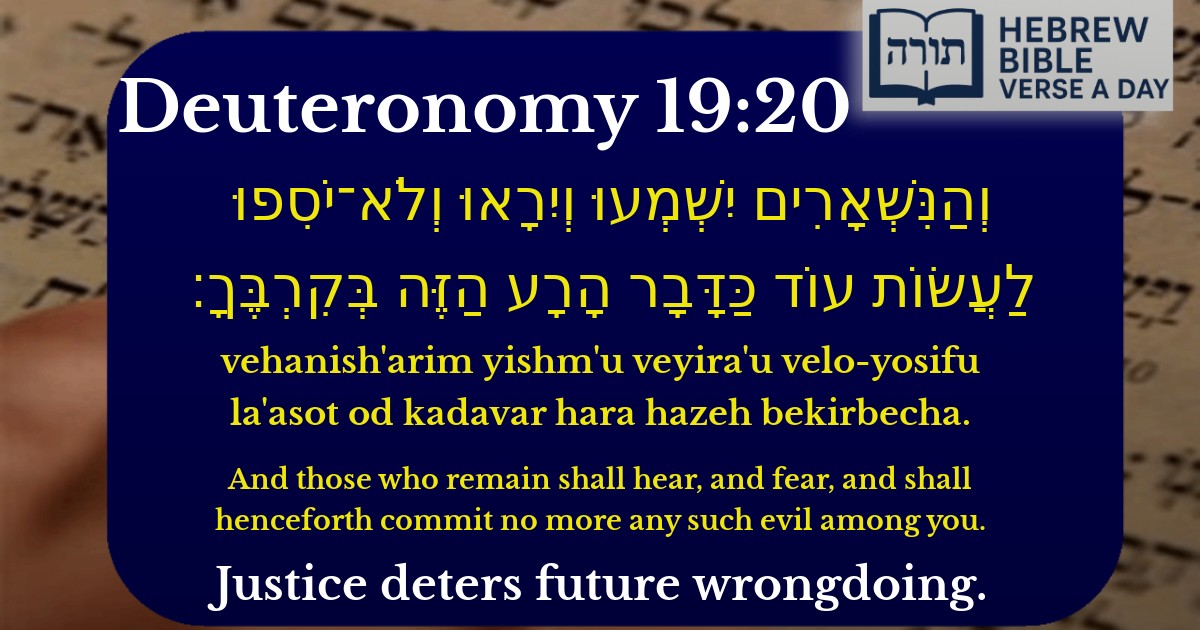Frequently Asked Questions
Q: What does Deuteronomy 19:20 mean?
A: Deuteronomy 19:20 teaches that when justice is properly carried out, it serves as a warning to others. The verse states that those who witness the consequences of wrongdoing will 'hear, and fear, and shall henceforth commit no more any such evil among you.' According to Rashi, this emphasizes the deterrent effect of justice—when people see punishment for crimes, they will be afraid to repeat those sins.
Q: Why is Deuteronomy 19:20 important in Jewish law?
A: This verse highlights a key principle in Jewish law—that justice must be public and effective to prevent further wrongdoing. The Rambam (Hilchot Sanhedrin) explains that proper legal procedures and punishments are not just about retribution but also about maintaining societal morality by setting an example for others.
Q: How does Deuteronomy 19:20 apply to us today?
A: The lesson from this verse is timeless: a just society must ensure that wrongdoing is addressed in a way that discourages others from repeating it. The Talmud (Sanhedrin 7a) discusses how judges must act with wisdom so that their rulings inspire reverence for the law. Today, this teaches us the importance of upholding justice in a way that strengthens moral behavior in the community.
Q: What does 'hear, and fear' mean in this verse?
A: The phrase 'hear, and fear' means that when people witness the consequences of sin, they will internalize the lesson and develop a healthy fear of wrongdoing. The Midrash (Sifrei Devarim) explains that this fear is not just about punishment but about recognizing the seriousness of violating G-d's commandments.
Q: Does this verse only apply to legal punishments?
A: While the immediate context refers to legal consequences, the principle extends beyond court rulings. The Talmud (Makkot 23b) teaches that even public rebuke and moral instruction should inspire people to avoid sin. Thus, the verse also applies to education and communal leadership in guiding people toward righteousness.


Context and Source
The verse appears in Devarim (Deuteronomy) 19:20, within the context of the laws concerning false witnesses (eidim zomemim). The Torah mandates that false witnesses receive the punishment they sought to impose on the innocent party, serving as a deterrent for others.
Explanation of the Verse
The phrase "וְהַנִּשְׁאָרִים יִשְׁמְעוּ וְיִרָאוּ" ("And those who remain shall hear, and fear") teaches that the public execution of justice serves as a warning to the community. Rashi explains that the punishment of false witnesses is not merely punitive but also educational—it instills fear in others, preventing them from engaging in similar wrongdoing.
Key Themes in Jewish Thought
Midrashic Insight
The Sifrei (Devarim 190) expands on this verse, teaching that when justice is properly administered, it purifies the community, as if removing a "rotten limb" to save the whole body. This aligns with the Torah's principle of "וְנִבְעַר הָרָע מִקִּרְבֶּךָ" ("you shall eradicate the evil from your midst").